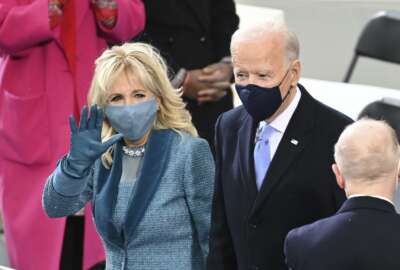UPDATED: Biden repeals Schedule F, overturns Trump workforce policies with new executive order
President Joe Biden took executive action Friday to repeal at least four Trump-era executive orders that limited collective bargaining and stripped certain job...
This story was updated on Friday, January 22, 2021 at 5 p.m. with more details on the new executive order and reactions from federal employee unions, groups and lawmakers.
President Joe Biden signed a new executive order Friday afternoon, overturning a handful of his predecessor’s policies that limited the collective bargaining power of federal unions and empowered agencies to move around their career employees.
“Career civil servants are the backbone of the federal workforce, providing the expertise and experience necessary for the critical functioning of the federal government,” the executive order, released late Friday afternoon, reads. “It is the policy of the United States to protect, empower and rebuild the career federal workforce. It is also the policy of the United States to encourage union organizing and collective bargaining. The federal government should serve as a model employer.”
The executive order repeals the three EOs President Donald Trump signed back in 2018, which limited collective bargaining, cut official time and prioritized employee firings and discipline.
Specifically, Biden’s new executive order directs agencies to revisit any actions they took to implement Trump’s 2018 EOs.
He then instructed agencies to suspend, revise, rescind or publish for notice and comment any proposed rules that will overturn those actions, including changes they made to union official time banks or disciplinary policies, as examples.
The order also directs agencies to bargain over “permissible,” non-mandatory subjects during contract negotiations, which the White House said would give federal employees a “greater voice” in their working conditions.
Repealing the workforce executive orders has been a top priority for federal employee unions, which spent much of the last few years fighting the EOs in court and at the bargaining table. During his campaign, Biden promised the unions he’d repeal the 2018 executive orders.
Unions, however, have said repealing the 2018 orders is only the first step.
“We believe President Biden’s new orders provide clear direction for labor relations officials at federal agencies to reverse course, and where necessary, return to the table to bargain in good faith with their employees as the law requires,” Tony Reardon, national president of the National Treasury Employees Union, said Friday afternoon. “In those cases where agencies used the Trump orders to take away employee or union rights, the damage can and should be undone immediately.”
Biden says ‘goodbye’ to Schedule F
Biden’s new executive order also eliminated Schedule F, the new excepted service classification Trump created via executive action in the last few months of his presidency.
It directed agencies to immediately suspend, revise and rescind any proposed actions, decisions or rules associated with the Schedule F order.
“The director of the Office of Personnel Management shall immediately cease processing or granting any petitions that seek to convert positions to Schedule F or to create new positions in Schedule F,” the order reads.
Trump’s EO allowed agency heads to reclassify certain policy-making positions into a new schedule of quasi-political appointees known as Schedule F. Career federal employees would lose their civil service protections in the process, meaning their agency heads could have fired them — and hired new replacements — at will.
Federal employee unions and organizations expected the new administration would eventually repeal Trump’s Schedule F executive order, but it was unclear how soon Biden would act. They, along with a handful of House and Senate Democrats, were especially vocal about their concerns over Schedule F and the consequences it could pose if implemented.
In the new executive order, the Biden administration described Schedule F as “unnecessary to the conditions of good administration” and one that “undermined the foundations of the civil service and its merit system principles.”
Biden also recorded a recent video message to the career federal workforce. In his message, he recalled the years he spent working with federal agencies as a senator and former vice president, and he said his new cabinet members were excited to work with the career workforce.
“You’re the ones running the show, to apply your experience and expertise to address the great challenges of our time, the pandemic, the economy, systemic racism, climate change, our national security and so much more,” Biden said. “We have such an opportunity. While I may not be able to meet each of you in person, I’m thinking of you and I have the utmost trust in your capabilities.”
Unions, some lawmakers praise new executive order
Many unions and Democratic lawmakers welcomed Biden’s new executive order. The American Federation of Government Employees called it a “new day of hope” for federal workers.
“President Biden’s action to restore workplace rights and protections for federal employees, along with his commitment to partner with labor unions as a good governance ally, means we can hit the ground running to help his administration deliver on vital priorities for the American people,” Everett Kelley, AFGE national president, said in a statement. “Federal workers can once again have confidence in their president’s commitment to the apolitical civil service, to standing up for workers’ rights and to upholding merit system principles that safeguard against political interference in employment decisions.”
NTEU had sued the previous administration over the Schedule F order and said it was especially pleased Biden had shelved the EO.
“The canceling of these executive orders is welcomed, but NTEU is also celebrating the president’s message that the expertise and experience of career civil servants will be valued under a Biden-Harris administration,” Reardon said.
Several House Democrats, including House Oversight and Reform Committee Chairman Carolyn Maloney (D-N.Y.) and Government Operations Subcommittee Chairman Gerry Connolly (D-Va.), also praised Biden’s new EO.
“The actions taken by President Biden today should demonstrate to our federal civilian employees that their work is important and respected, and will be protected,” House Majority Leader Steny Hoyer (D-Md.) said in a statement.
But at least two House Republicans said they believed Biden’s new order allowed the bureaucracy to go unchecked.
“The American people must be able to hold all federal employees — elected and unelected—accountable for their actions,” Oversight Committee Ranking Member James Comer (R-Ky.) and Government Operations Ranking Member Jody Hice (R-Ga.) said. “This repeal by President Biden fails to empower the American people and instead empowers the bureaucracy.”
Beyond repealing the four Trump-era executive orders, Biden will also focus on providing a higher minimum wages to federal employees and contractors.
The new executive order doesn’t go into much detail. It simply directed OPM to develop recommendations for paying more federal employees $15 an hour.
Biden will also ask agencies to explore the possibility of a $15 minimum wage for federal contractors.
“The federal government should only award contracts to employers who give their workers the pay and benefits they have earned,” according to a White House fact sheet on the new orders. “President Biden is today directing his administration to start the work that would allow him to issue an executive order within the first 100 days that requires federal contractors to pay a $15 minimum wage and provide emergency paid leave to workers.”
Copyright © 2025 Federal News Network. All rights reserved. This website is not intended for users located within the European Economic Area.
Nicole Ogrysko is a reporter for Federal News Network focusing on the federal workforce and federal pay and benefits.
Follow @nogryskoWFED





